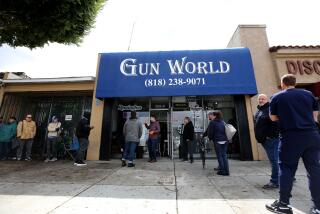Senate Hearings Aimed at Reining In Sweepstakes
- Share via
WASHINGTON — Super Bowl Sunday is usually a depressing day for Eustace Hall--not because his team loses, but because Publishers Clearing House never comes to his house to award him millions of dollars. Hall has even put up signs on his Florida home to make sure the company’s famed Prize Patrol would know it had the right house.
Hall, a retired medical technologist, has spent more than $15,000 since 1992 entering sweepstakes. He always bought something, because he thought that gave him a better chance of winning.
But the only winners, Hall said, have been the sweepstakes companies. “They are the ones who won the prize--all of my money.”
Hall is not alone. He will be among several witnesses testifying today before the Senate permanent subcommittee on investigations as it begins hearings into the marketing practices of sweepstakes firms.
The hearings are expected to be the first step toward a new law designed to curb deceptive and misleading sweepstakes offers. Even industry executives who aggressively opposed such a measure last year now acknowledge that some sort of legislation is likely.
“We support national legislation that would set clear, uniform standards for business to follow,” said Christopher L. Irving, director of consumer affairs for Publishers Clearing House. Executives from Publishers Clearing House will testify Tuesday, along with officials from the other major sweepstakes companies: American Family Publishers, Reader’s Digest and Guaranteed & Bonded, the sweepstakes arm of Time Inc.
“I’m convinced we need a federal law and tougher penalties,” said Sen. Susan Collins (R-Maine), chairman of the subcommittee. Collins said she is troubled by the scores of “sad stories” from people who have been taken in by “increasingly deceptive and increasingly aggressive” promotions and are “squandering their life savings to make purchases, thinking they’re going to win.”
Collins pointed to a recent mailing in which the required statement, “No purchase or payment necessary to enter or win,” was “in type so small I literally couldn’t read it.” Similarly, she said she is disturbed by promotions telling consumers that they are “guaranteed winners” or “finalists”--giving the false impression that they are among a very select group.
The sales pitches clearly work, she added. “We know that Publishers Clearing House has 125,000 customers who [each] order over $1,000 of merchandise each year. That’s a phenomenal amount when you consider these are small purchases, which means people are entering over and over and over again.”
“The high dollar amount shouldn’t raise concern,” Irving said. “The only concern we have is, do consumers understand no purchase is necessary? We’re confident they do, but we personally contact those consumers most active in our files and make sure they understand.” If not, he said, they are removed from the company’s mailing lists.
Under Collins’ proposed legislation, sweepstakes firms would have to disclose more prominently the “no purchase necessary” statements. They would have to include the odds of winning in each offer, and could no longer tell consumers they are winners unless they have actually won. The proposed measure imposes strong financial penalties--as much as $2 million, depending on the number of mailings sent--for misleading solicitations.
More to Read
Inside the business of entertainment
The Wide Shot brings you news, analysis and insights on everything from streaming wars to production — and what it all means for the future.
You may occasionally receive promotional content from the Los Angeles Times.










